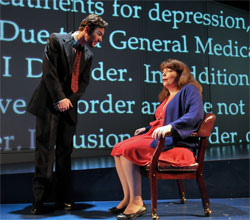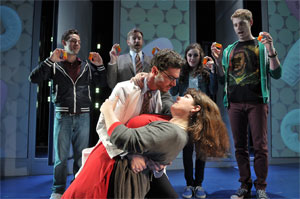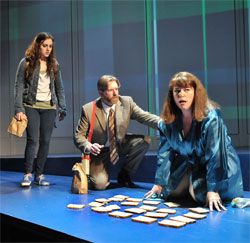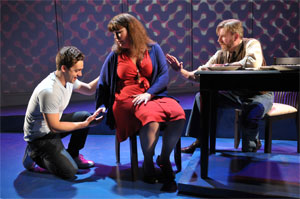Musical Play (2008)
Music by Tom Kitt
Book and Lyrics by Brian Yorkey
Directed by Paul Daigneault
Music Direction by Nicholas James Connell
Scenic Design by Eric Levenson
Lighting Design by Jeff Adelberg
Sound Design by Aaron Mack
Projection Design by Seaghán McKay
Speakeasy Stage Company
Boston Center for the Arts
Boston, MA
With Kerry A. Dowling (Diana), Michael Tacconi (Gabe), Christopher Chew (Dan), Sarah Drake (Natalie), Michael Levesque (Henry), Chris Caron (Dr. Fine/Dr. Madden)

Diana (Kerry A. Dowling) is a middle-aged housewife with a mental condition. It seems that she is bipolar, but she also has delusions, which suggests something more. Her husband, Dan (Christopher Chew), is energetic about her finding psychiatric help, and her daughter, Natalie (Sarah Drake), a teenager, suffers the rebound effects of this situation. How does delusion manifest itself, and how best can it be managed? How can she and Dan wrestle with the issues that surround their son, Gabe (Michael Tacconi)? Can psychiatry answer the problem? How will the family fare?

Kerry A. Dowling as Diana
Photo:Craig Bailey/Perspective Photo
First off, let me say that this production is very tight and well done. The singing and the music are excellently performed. There are some considerable subtleties of tonality and harmony in the music and the performers live up to the expectations beautifully. As well, the scenic design is simple, but very intelligently conceived. A series of projections on the paneled background provide the necessary changes of setting and mood very effectively.
Secondly, let me say that I fully support the attempt of theatre, even musical theatre, to address difficult issues like mental illness. Obviously, finding artistic outlets for dealing with the complexities of depression, bipolarity and schizophrenia and their manifold impacts on family relations, is an important and noble effort.
As well, let me underline that all of the actors did a very commendable job. I was most taken with Sarah Drake in the role of the daughter, Natalie, and with Michael Levesque who plays her boyfriend, Henry. They conveyed their roles particularly affectingly and straightforwardly.

Rear from Left: Michael Tacconi, Christopher Chew,
Sarah Drake, and Michael Levesque
Photo: Craig Bailey/Perspective Photo
But, that said, frankly, I had a good deal of trouble with the writing and the music.
The book and the lyrics were, for me, fundamentally off key. A note in the program indicating the genesis of the project reinforced the general sense I had about it.
Apparently the project got started in 1998 when the author, Brian Yorkey, several years out of college, saw a piece on Dateline NBC about a woman with bipolar disorder undergoing electroconvulsive therapy. He and Tom Kitt, a college friend, who did the music, created a ten minute piece about it entitled Feeling Electric, which over the course of the next ten or eleven years they expanded into the current show.

Kerry A. Dowling
Photo: Craig Bailey/Perspective Photo
And this is how it felt to me: that this was written by two young guys who had encountered a journalistic piece about mental illness and wanted to write a musical. They obviously, over time, took pains to create a narrative and a full array of songs, but the feeling of the entire piece, to me, was of something manufactured from a news article, not something that probed the depths of the issue at hand.
Having known people who have wrestled with severe bipolarity and clinical depression, I felt sensitive about what seemed, for the bulk of the show, to be a kind of facile, showbizzy approach to the issue.
There was something offhandedly satirical about the writing that bothered me. I think it was supposed to feel acute, wry and poignantly funny, but to me it seemed bizarrely jazzy and tonally off the mark.
Nonetheless, the narrative turns near the very end of the show felt somewhat more authentic than anything that preceded it and rescued me somewhat from the sense of alienation I had from most of the writing beforehand.

and Christopher Chew
Photo: Craig Bailey/Perspective Photo
The music also seemed like an indelicate combination of raucous and mawkish. Occasionally, it evoked in me a feeling of authenticity; but more often than not it felt alternately too jumpily agitated, then too sentimental. Where it might have conveyed complexity of feeling, it opted for cleverness and rowdiness mixed with emotional gooeyness in a way that, to my ears, fell flat.
Mental conditions have, in recent years, become a very hip thing to write about. There have been on the market multiple published memoirs about mental illness and its effects on families. And at least one major television series features a main character who has a mental condition.
If those narratives are well-executed, that is all to the good. But, if the subject gets capitalized on in a way that feels less than sensitive and insightful, the effect is not rewarding.
Though this production was musically and technically well executed, it was difficult to understand how this show received the Pulitzer Prize for Drama in 2010 and the Tony Award for Best Score of a Musical in 2009. Obviously, others felt it was a major accomplishment of authorship and music.
– BADMan

Leave a Reply